How to outsource link building - Actionable Tips

Link building is one of the most impactful, yet challenging, aspects of search engine optimization (SEO).
This process involves identifying quality link opportunities, crafting personalized outreach, negotiating placements, and maintaining long-term relationships. All of this takes significant time and expertise, which is why many businesses turn to outsourcing.
Outsourcing link building allows you to delegate this specialized and time-consuming task to external professionals—be they agencies, freelancers, or services offered via online marketplaces. When done right, outsourcing can save time, deliver better results, and let you focus on your business’s core strengths.
This guide breaks down everything you need to know about outsourcing link building. We’ll cover how to figure out which pages deserve the most attention, how to pick the right partners, and how to handle any bumps along the way. By the end, you’ll feel confident and ready to tackle the process like a pro in 2026.
TL;DR
- Why Outsource: Link building is labor-intensive; outsourcing saves time and provides access to expertise and scalable infrastructure.
- Target "Money Pages": Focus link-building efforts on pages that drive revenue (product, service, or landing pages) for the best ROI.
- Outsourcing Options: Choose between full-service agencies ($5k-$15k/mo), freelancers ($200-$3k/mo), or marketplaces like Lemonet/LinkBroker ($100-$700/link).
- GEO & AI Search: In 2026, outsourced links must come from high-authority, niche-relevant sites to serve as "trust signals" for AI models (ChatGPT, Perplexity).
- Budget Hack: Use RankChase for automated, niche-relevant link exchanges at a fraction of the cost ($2-$3/link).
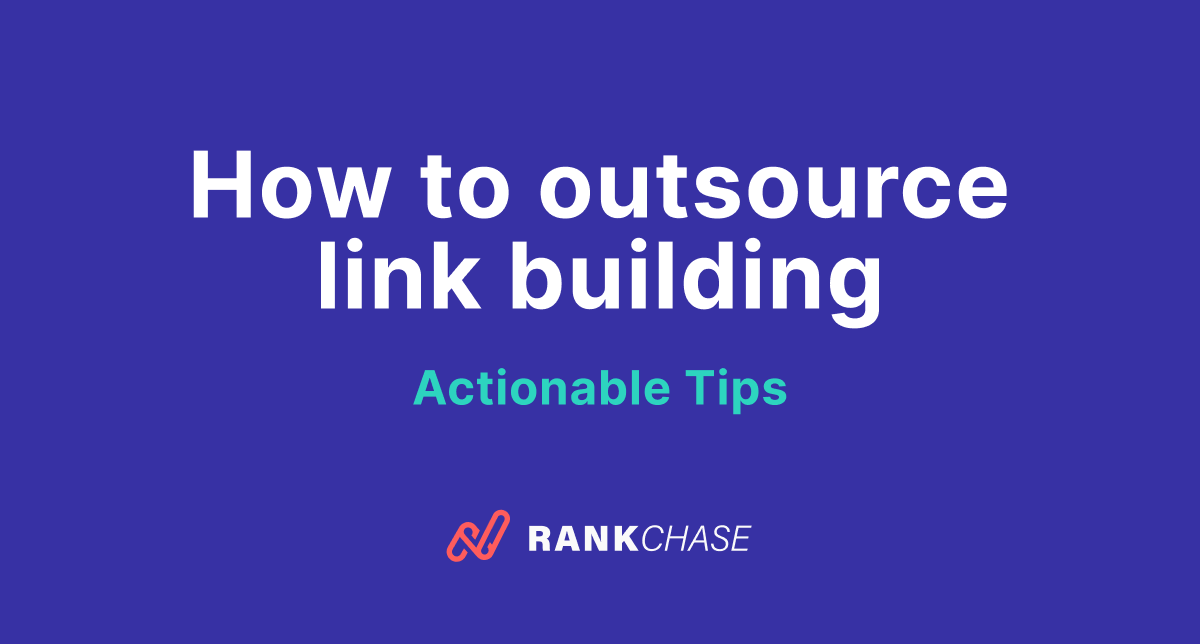
Why Outsource Link Building?
Before diving into the practical steps of outsourcing, let’s address why businesses choose this route in the first place.
Understanding these reasons will help you assess whether outsourcing aligns with your needs.
Time and Resource Efficiency
Link building requires more than just sending out a few emails. You'll need to research prospects, personalize outreach, negotiate placements, and ensure the links acquired are high-quality and relevant.
Building links manually is a tedious process that can pull your team’s focus away from more strategic tasks like product development or customer acquisition. Outsourcing allows you to hand over this burden to professionals, freeing up internal resources for higher-priority work.
Access to Expertise
SEO is a constantly evolving field. Techniques that worked well last year may now be outdated, or worse, penalized by search engines. Professionals specializing in link building stay on top of these changes. In 2026, they focus on building "AI-ready" link profiles that satisfy both Google's algorithm and the citation requirements of generative engines. They know how to evaluate link quality, prioritize high-authority domains, and adapt their strategies to current best practices.
Scalability
As your business grows, so does the need for more backlinks to maintain competitive rankings. A small in-house team can quickly become overwhelmed by the workload required to scale link-building efforts in 2026's competitive landscape. Agencies, freelancers, and marketplaces offer the resources and infrastructure to handle these demands, ensuring consistent results as your business expands.
Cost-Effectiveness
While outsourcing comes with a price tag, it often proves more cost-effective than hiring a dedicated in-house resource. Costs like salaries, benefits, and training are eliminated. Instead, you pay for a predictable service—whether it’s a monthly retainer with an agency or per-link pricing from a marketplace.
Best Pages to Target for Backlinks - Focus on “Money Pages”
Before outsourcing your link building, make sure you’ve done your homework—optimize your site and pinpoint the pages that will benefit the most from having links built to them.
It’s important to prioritize the pages that deliver the highest return on investment. These are often referred to as money pages.
What Are Money Pages?
Money pages are the sections of your website that directly contribute to revenue or conversions. They could be:
- Product Pages: Pages that showcase your best-selling products.
- Service Pages: Pages detailing your top services.
- Landing Pages: Dedicated pages designed to convert traffic from marketing campaigns.
By directing backlinks to these pages, you amplify their visibility in search results, drive qualified traffic, and increase conversions.
How to Identify Money Pages
To determine your most valuable pages, use analytics tools such as:
- Hotjar: Visualize user behavior to identify which pages hold their attention.
- Conversion Tracking: Set up goals in Google Analytics to measure how visitors move through your site and which pages lead to sales, sign-ups, or other key actions.
Once you’ve identified your money pages, ensure they’re optimized with compelling content, clear calls-to-action (CTAs), and an intuitive design. Only then should you direct your link-building efforts toward these pages.
Why is this so important?
You might think that as long as your pages rank near the top on Google, you're set when it comes to visibility and clicks. While that’s partly true, the number of clicks you can gain from moving up even one spot in the rankings can be surprisingly significant.
For example, the difference in click-through rate (CTR) between being in the first position versus the fourth is massive and it can have a major impact on your business.
That’s why, when building links, it’s worth considering boosting pages that are already doing well in search results. Even a small jump in position, especially for a high-converting money page, can lead to big results.
Here’s how CTR typically varies for pages in the top rankings:
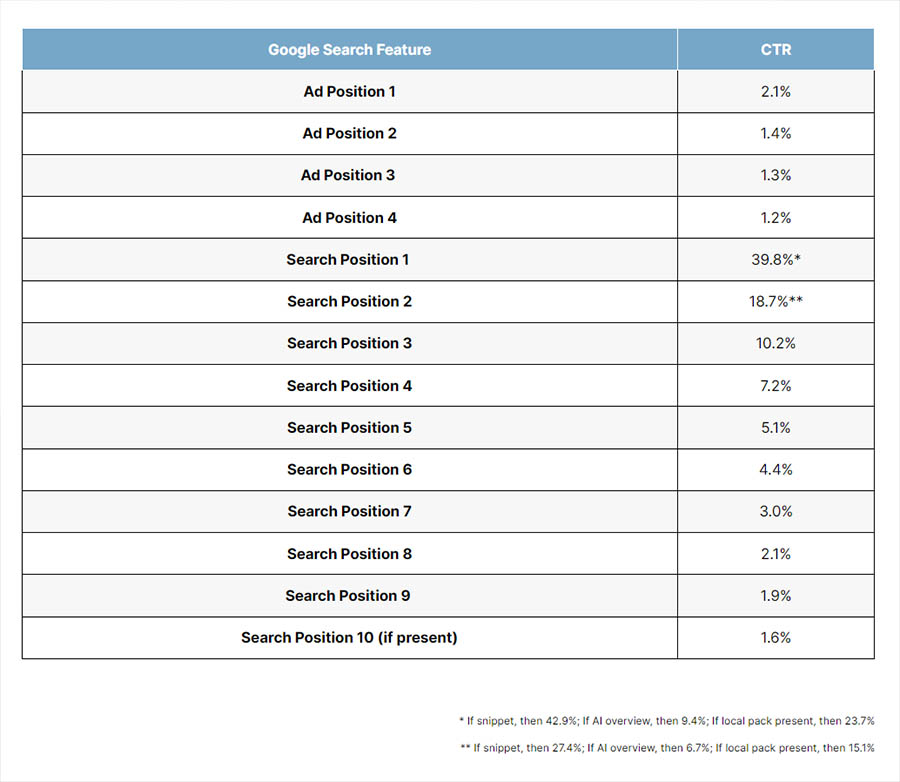
How to Outsource Link Building
Outsourcing link building involves preparation, selecting the right partner, and staying actively involved to ensure success. Here’s how to approach it step by step:
Step 1: Prepare Your Website
Before acquiring backlinks, your website must be ready to leverage their benefits. Think of this as laying the foundation before constructing a house.
-
Audit Your Website:
- Fix technical issues like slow page speeds, broken links, and crawl errors using tools like Bright SERP.
- Ensure your site is mobile-friendly and offers a seamless user experience. Make sure all aspects from Google's Page Speed Insights are checked.
-
Optimize Your Content:
- Identify cornerstone content—detailed, authoritative pieces that naturally attract links.
- Update your money pages with relevant keywords, rich media, and compelling CTAs.
-
Keyword Alignment:
- Ensure your content targets specific keywords so backlinks align with your SEO strategy.
Step 2: Set Measurable Goals
Outsourcing efforts should be guided by clear objectives. Avoid vague aspirations like “get more backlinks” and instead aim for SMART (Specific, Measurable, Achievable, Relevant, Time-bound) goals.
Examples:
- Acquire 20 high-quality backlinks (DA 50+) for money pages within three months.
- Increase organic traffic by 30% to a landing page within six months.
- Improve domain authority from 40 to 50 over the next year.
Step 3: Choose Your Outsourcing Method
There are multiple ways to outsource link building, each with its own benefits and considerations:
1. Agencies:
- Full-service solutions with teams that handle everything from outreach to reporting.
- Best for large-scale campaigns and businesses with higher budgets.
- Cost: Monthly retainers typically range from $5,000 to $15,000.
- Example: Skyrocket Marketers — Cyprus-based digital marketing agency offering SEO services, SEO guest posting, social media management, and web design solutions.
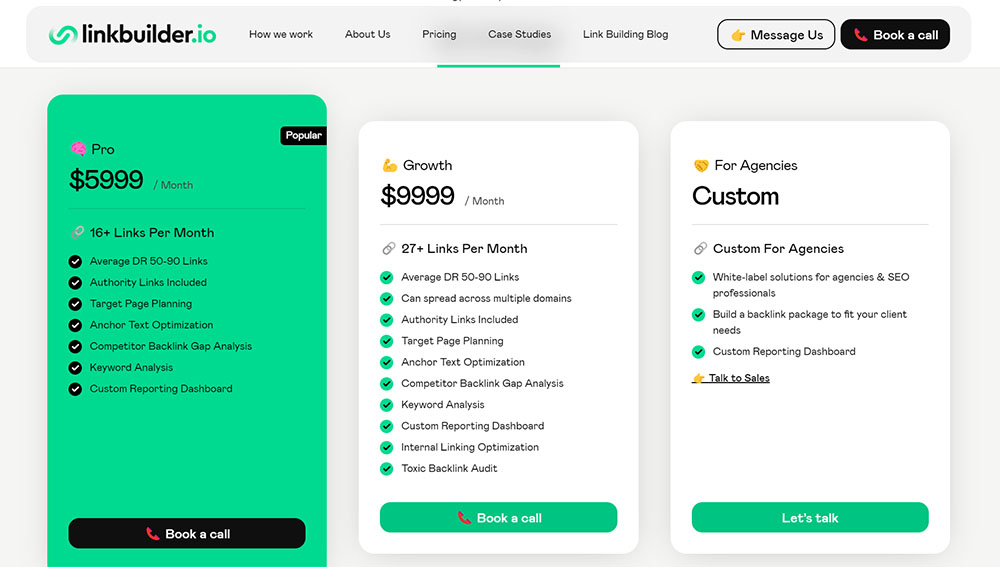
2.Freelancers:
- Hiring link-building freelancers is often more affordable and flexible, but the results can vary greatly depending on the freelancer’s skills. Platforms like Upwork and Fiverr are popular for finding freelancers, but be cautious—many providers on these sites may lack the necessary expertise or reliability. Take the time to thoroughly vet your freelancer to ensure they’re the right fit.
- Ideal for smaller campaigns or businesses with limited budgets.
- Cost: Rates vary from $200 to $3,000 per month, depending on experience.
- WARNING: Avoid buying bulk cheap backlinks. If someone offers quick results or a massive number of backlinks at a very low price, it’s a red flag. This approach can damage your rankings and hurt your site in the long run. Quality always matters more than quantity.

3. Marketplaces:
-
Using link building tools such as platforms like Lemonet or LinkBroker offer streamlined services, allowing you to purchase backlinks yourself from verified sources. The prices can vary from $95 to $50.000 if you are purchasing a backlink on Forbes!
-
Cost:
- DA 30–40: $100–$250 per link.
- DA 50+: $300–$700 per link.
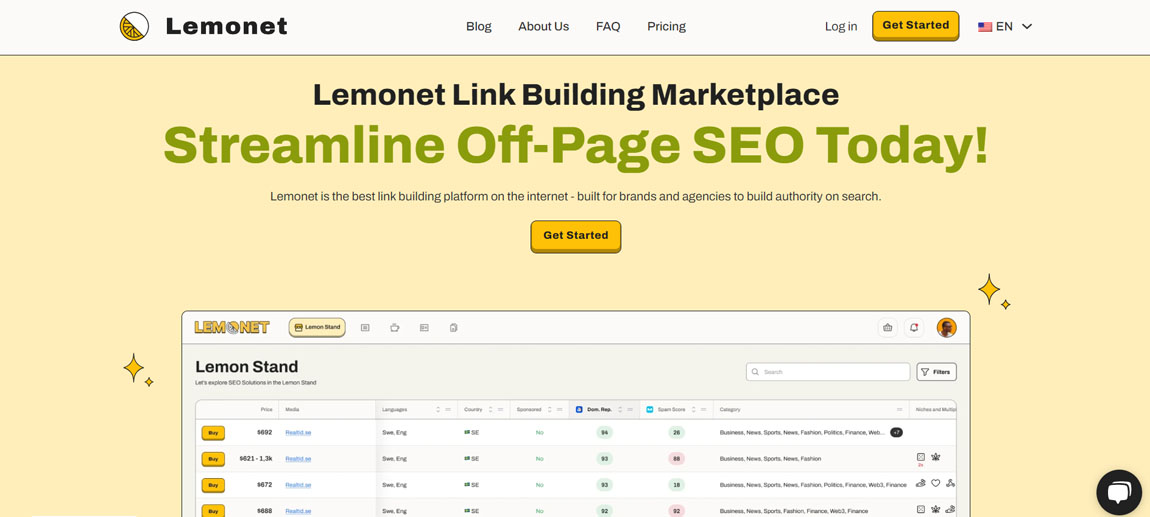
4.Match making platforms for link exchanges
- Platforms like RankChase simplify the process of finding reciprocal link partners. By submitting your domain, the platform automatically connects you with relevant websites seeking link exchanges.
- Cost: You can secure high-quality backlinks for as little as $2–$3 on average from niche-relevant websites. The catch is that you’ll need to provide one backlink in return.
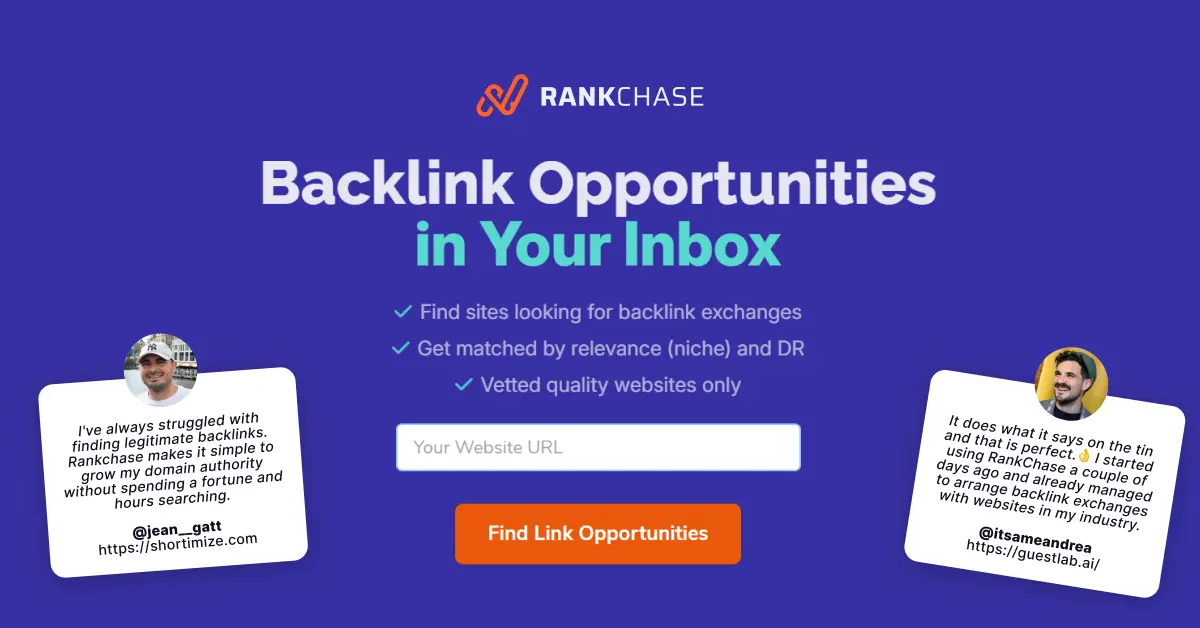
Check out this article to learn more about how much backlinks cost.
Step 4: Vet Potential Partners
Whichever method you choose, vet your partners thoroughly to avoid poor-quality links or shady practices.
Key Questions:
- What is your outreach strategy?
- Can you provide case studies or references?
- Do you follow white-hat practices?
- How do you measure success?
Step 5: Monitor Progress
Outsourcing doesn’t mean relinquishing control. Regularly review performance reports to ensure the campaign aligns with your goals. Pay attention to:
- The quality and relevance of acquired links.
- The domain authority of referring sites.
- The impact on keyword rankings and traffic.
Key Concerns When Outsourcing Link Building
Outsourcing link building can be a smart move, but like any strategic decision, it comes with its share of challenges. By anticipating these potential issues and planning ahead, you can navigate the process with confidence. Let’s explore some common pain points and actionable solutions.
-
Fear of Low-Quality Links
One of the most significant concerns with outsourcing is the risk of acquiring low-quality or spammy backlinks.
These can harm your website’s credibility, drag down your rankings, and even lead to penalties from search engines. The idea of spending money only to see your efforts backfire is understandably nerve-wracking.
The only way to address this concern is by staying vigilant.
Start by selecting partners who emphasize white-hat practices and are transparent about their methods. Tools like Google Search Console, Monitor Backlinks, or Ahrefs can help you keep an eye on the links being acquired. Regularly check:
- Relevance: Are the links coming from sites in your niche?
- Authority: What is the domain authority (DA) or domain rating (DR) of the referring site?
- Anchor Text: Is it natural and varied, or does it look spammy and over-optimized?
If you spot questionable links, address them immediately with your provider. This proactive approach ensures you catch potential issues before they escalate.
-
Budget Constraints
High-quality link building isn’t cheap. Whether it’s an agency charging thousands per month or a freelancer billing per link, the costs can quickly add up. For small businesses or startups, this can feel overwhelming.
However, budget constraints don’t have to mean you can’t participate in link building.
Start small and prioritize your money pages—the sections of your site that drive the most conversions. Instead of attempting to build dozens of links, aim for fewer but higher-quality links that deliver measurable impact.
Freelancers and marketplaces like Lemonet or LinkBroker offer cost-effective alternatives to agencies.
Platforms like RankChase are also a budget friendly alternative helping you connect with partners in your niche who are open to valuable link exchanges.
By targeting specific opportunities and avoiding bulk link-buying services, you can manage costs while still achieving results. Remember, it’s not about the number of links—it’s about their quality and relevance.
-
Lack of Communication
Working with external providers sometimes feels like you’re in the dark. If you’re not getting updates or clear explanations about progress, it can be frustrating and leave you wondering if your money is being well-spent.
Communication is critical for successful outsourcing. During the vetting process, ask potential providers about their reporting structure.
Reliable partners should offer regular updates detailing:
- Links acquired (with URLs).
- Metrics like DA/DR of the linking sites.
- The impact on your rankings or traffic.
Set expectations upfront. Will they provide weekly, biweekly, or monthly reports? How often can you schedule check-ins? Partners who are transparent and open about their processes will make you feel more in control of the campaign.
Additionally, request a direct point of contact—a person you can reach out to with questions or concerns. This ensures you have a line of communication open at all times.
-
Slow Results
Link building is a long-term investment, and waiting months for visible results can be frustrating, especially if you’re under pressure to show immediate ROI.
A good link-building campaign takes time because acquiring high-quality backlinks involves relationship-building, negotiation, and thorough research. While you may see small wins early on, the full benefits often unfold over several months.
According to Authorityhacker it can take months for backlinks to impact your search results so stay patient, consistent and trust the process.

Break your larger goals into smaller milestones to track progress along the way. For instance:
- Month 1: Secure the first 5–10 backlinks to cornerstone content.
- Month 3: Increase rankings for a specific target keyword.
- Month 6: Boost organic traffic by a set percentage.
Sharing these milestones with your provider helps maintain motivation and ensures you’re on the same page about progress. Meanwhile, focus on other aspects of SEO—like on-page optimization and content creation—to complement your link-building efforts and drive results faster.
Conclusion: Outsourcing in the Age of AI Search
Outsourcing link building is an effective way to improve your website’s authority and rankings without overburdening your internal team. In 2026, the focus has shifted from just "getting links" to acquiring high-authority citations that satisfy both traditional search algorithms and generative AI models.
By focusing on money pages, choosing the right outsourcing method, and addressing common challenges, you can create a sustainable and impactful SEO/GEO strategy.
Whether you partner with an agency, freelancer, or buy links on marketplaces, the key to success lies in clear goals, regular oversight, and a focus on quality over quantity. With the right approach, outsourcing link building can drive significant returns for your business in the evolving digital landscape.